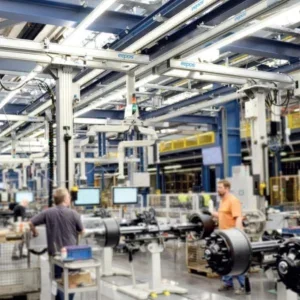It has been quite a year for Pelloby, the UK crane manufacturer. New owners have come in and restructured the company. They have moved the business to smaller premises down the road and introduced manufacturing and management efficiencies which mean greater profits, they say, in spite of a reduction in turnover.
Pelloby was founded 33 years ago in Telford. It grew out of the ashes of Rapid Cranes, a manufacturer whose premises burned down in the 1960s. At the outset, Pelloby was mainly engaged in general steel fabrication work. Over the years the crane business increased to become a specialism, and from that the company also went into automated crane systems and the manufacture of bespoke lifting equipment. More than 40,000 Pelloby products are claimed to be out in the field.
Today the company claims to be the UK market leader for jib cranes and is now known primarily for these products. Market focus is on the UK, where cranes are mostly sold to resellers. These preferred dealers brand the Pelloby cranes as their own. Exports are therefore generally indirect but the company is looking at expanding abroad, initially into mainland Europe. There have, however, been some repeat export orders, for example for Pakistan and Saudi Arabia.
There is a family feel to Pelloby. Managing director Glen Hickman first joined the company at 17. His father Arthur Hickman spent 25 years at the company and managed production. After Glen Hickman had reached the position of senior salesman he moved on, briefly, to Demag and then to a machine tool company. He returned to Pelloby, however, in 1994. Many of the staff have been there 15 years or more, including sales representative Alan Gilford, who has been handling Scotland and the North of England for 16 years.
In June last year Hickman led a management buyout (MBO) from the previous owners who wanted to retire. The factory, on land bought by the company many years ago, had more space than was needed and so on 31 July 2000 production was moved to new premises, just 250m away to a smaller building, in a swap with a neighbour looking for more space.
In addition to downsizing, the restructuring since the MBO has included a focus on the core business of building tailor-made jib cranes, portal gantries, overhead cranes and other bespoke lifting equipment. The design and manufacturing processes have also been improved.
Before the MBO Pelloby was taking on large contracts such as one from Toyota in France for £1.25m ($1.8m), but margins were low and resources were stretched by having to divert energy from the core products business that was supporting the big projects. Changing the company structure has meant that overheads can be better managed, Hickman says.
Turnover is down from £5m ($7m) before the MBO to £3m ($4.2m) this year. Hickman claims the restructured Pelloby is more profitable from the smaller turnover, achieved by “concentrating on what we’ve always done best” – which is focusing on jib cranes and smaller value orders rather than large high-risk contracts. Annual production is running at around 600 jib cranes and portable gantries.
An improvement in workflow of the whole process is beginning to be seen which means a reduction in the time to market. Design is the first area where time has been saved. Quotes can now be produced in minutes instead of days by using a new computer software system developed in-house. Without the computer system it used to take up to three days to design a crane on paper and therefore to produce a quote. The new system produces a jib crane design and scale drawing in colour to exact requirements and dimensions rather than having to choose from components that cover a range.
At least 90% of jib crane design requirements can be produced using the system, Pelloby claims. The system processes standard wall and post mounted jib cranes, typically up to 10t capacity, 15m radius and 18m high. Other sizes can also be accommodated at smaller capacities. For example, a recent order was for two units of the 360 model which were 23m high and had a 1t safe working load.
Prices are updated at least as often as orders are placed and the component details are stored in a spreadsheet format separate from the rest of the main software package. Consideration is already being given to expanding into an overall management software system on a company-wide structure.
All cranes are built to order and delivery times have been reduced to typically three or four weeks from up to six weeks previously. Cranes can be delivered in as little as two weeks, Hickman claims, depending on availability of materials.
As part of a drive to adopt a just-in-time philosophy, materials stocks such as steel sections are no longer held at Pelloby because the range required is so vast. When an order for a crane is received sections are bought in from stockholders pre-cut to length. Profiling is done in-house on a CNC profiler and all parts are marked with a contract-specific identification number and stored together in stillages as a kit of parts until required for fabrication. This traceability applies to all components as the pre-cut sections from stockholders are individually ordered items.






